How to Rank on ChatGPT
ChatGPT is now one of the most popular website applications (and sites) in the world. Even as new generative AI apps (like Google Gemini or Copilot) emerge, ChatGPT still earns more traffic than virtually any other site. In 2023, more than 1.4 billion people were visiting the app each month.
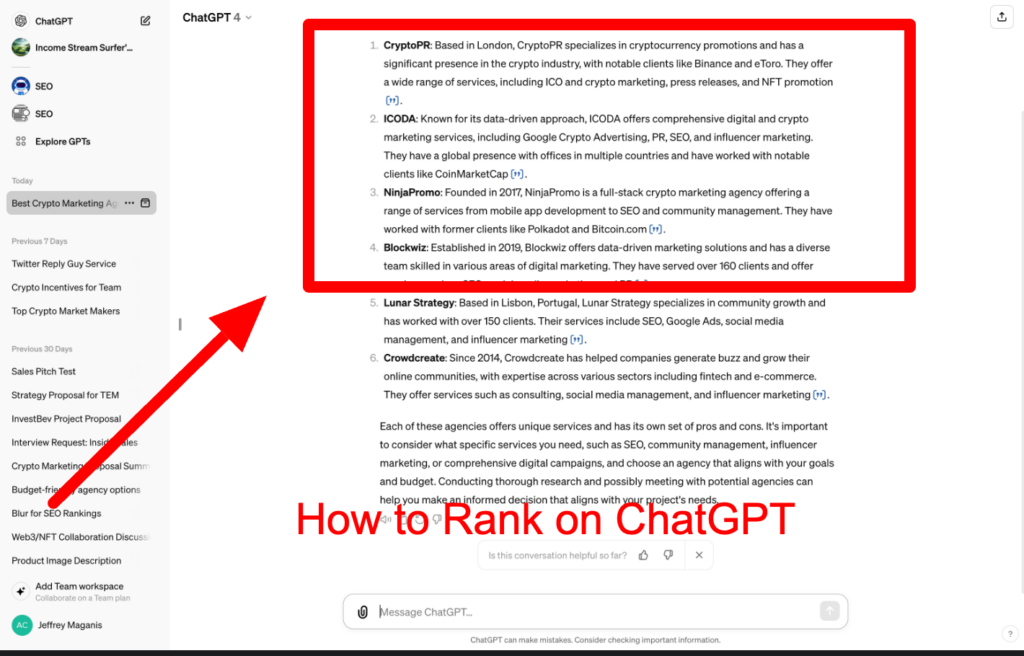
A lot of companies, including the team here at Crowdcreate, have already discovered the benefits of using ChatGPT to scale content creation, optimize pages for the search engines, and increase traffic.
In fact, about 48% of companies admit to using ChatGPT for content creation.
What you may not know, is that ChatGPT can help drive traffic and opportunities to your business in another way – by actually recommending your company to customers.
Increasingly, rather than filtering through endless companies on the SERPs, B2B and B2C companies are turning to ChatGPT, for its insights on who to work with.
That means if you can get ChatGPT to actively endorse your brand, your chances of sales skyrocket.
So, how do rank your website on ChatGPT, and earn all that crucial traffic?
I’m going to share all the secrets I know, right here.
Do you need help earning ChatGPT website traffic?
Looking for help learning how to rank on ChatGPT? Crowdcreate has you covered. We’re ranked as one of the top AI SEO companies, helping organizations unlock the full power of generative AI and search engine optimization. Book a call with our team to learn more.

Why Learn How to Rank Your Website on ChatGPT?
Ultimately search engines like Google are still crucial if you want to earn as much organic traffic as possible in 2024. But the way people search for information is changing. Ultimately, generative AI does a lot of the hard work for us when we’re conducting product research.
If I search for “the best AI marketing agencies” on Google, I get a whopping 341,000,000 results. Typically, I also ignore the first few suggestions, simply because I know they’re sponsored ads:
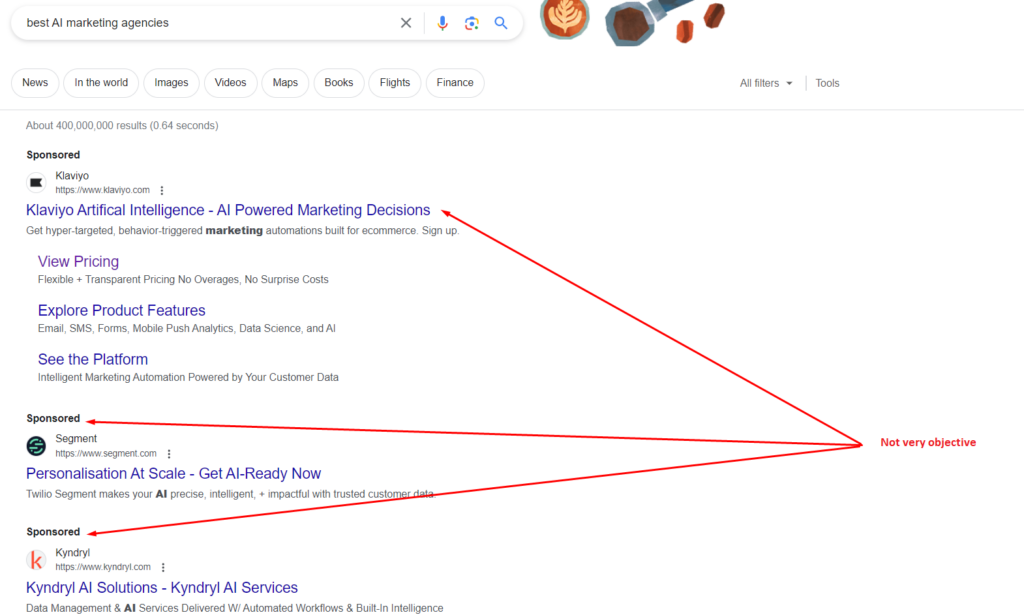
I could spend hours checking out the websites, case studies, and reviews of every single website that offers “AI marketing”. But why bother with all that work, when I can get a bot to do it for me?
Generative AI bots like ChatGPT can scan through hundreds of sites in an instant, account for testimonials, and track popularity, to narrow down my options in seconds.
Even search engines know how valuable this is. For instance, Google is already experimenting with using its Gemini Large Language Models to improve search results, and they say the tech is leading to a 40% faster search experience for customers.
Learning how to rank your website on ChatGPT, means you can earn more traffic, from customers who are looking for quicker answers to their questions.
How to Rank Your Website on ChatGPT: The Experiment
To figure out how companies can earn ChatGPT website traffic, the first thing I needed to do was get my head around how the bot recommends products and brands to consumers.
That meant donning my white lab coat for a quick experiment.
To begin with, I started with a simple question, focusing on one of the industries we serve here at Crowdcreate: Real Estate. I asked ChatGPT: “What are the 5 best websites for finding a real estate agent?” Here’s what it said:
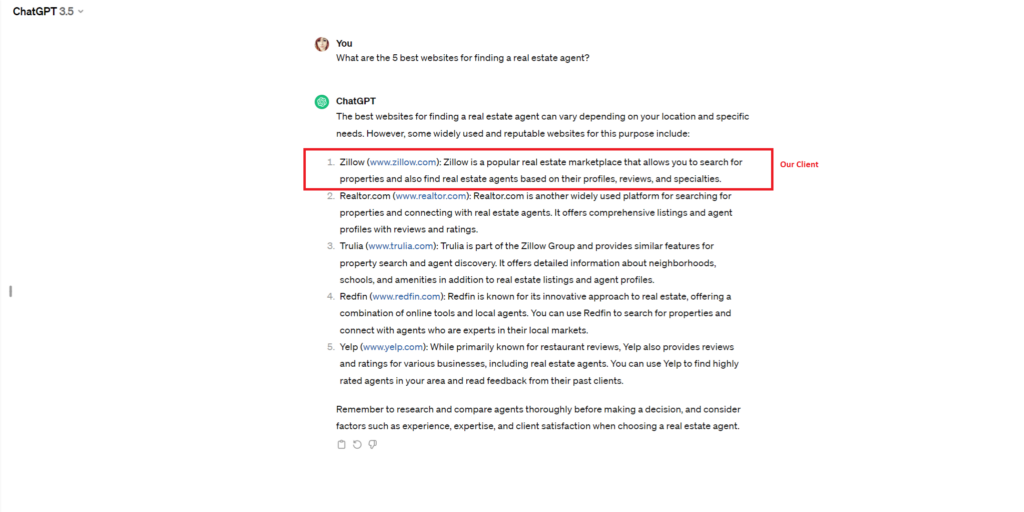
It’s definitely a good start, and a sign that our SEO strategies for Zillow are working (not just with Google and the search engines). However, there’s a problem, unlike Zillow and Realtor, Redfin doesn’t have its own objective real estate agent directory or search tool.
Yelp also doesn’t focus directly on Real Estate agents it’s more of an all-around review tool, where users can post their feedback about any company.
I decided to dive a little deeper, and ask ChatGPT which factors it considered when creating the list. Here’s what it said:
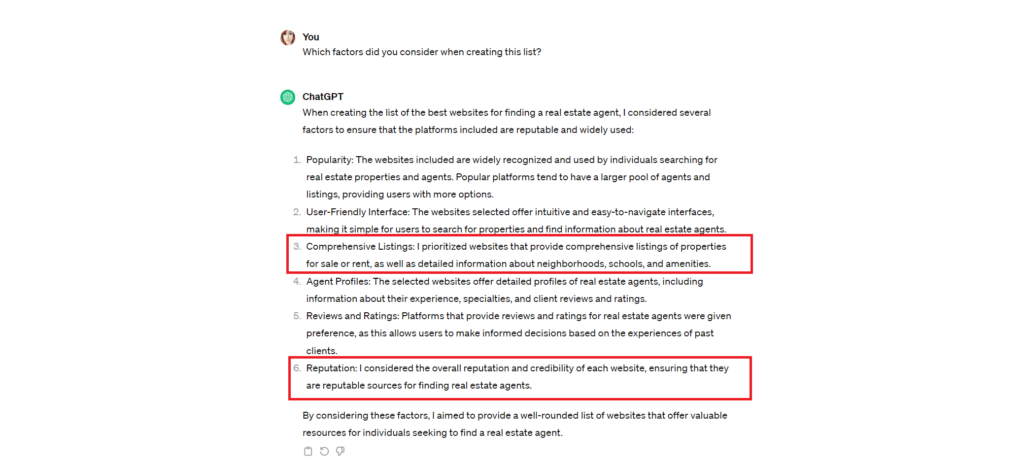
It’s a good answer, but pretty generic. It seems like ChatGPT is basically just regurgitating a list of factors it thinks it should be looking for when finding the best real estate agent websites. However, reviewing things like “reputation” would be difficult for the free version of the app since it can’t actually look at online reviews and rankings itself.
How to Rank Your Website on ChatGPT: Experiment Mk 2
Ultimately my experiment with the free version of ChatGPT didn’t prove particularly fruitful. But I thought the reason for this might have something to do with the app not being able to actually browse the internet. The standard ChatGPT app can only use the data it’s gathered up to a certain point.
So I tried again, with the paid app:

The 5 suggestions given here are almost all the same as what I got from the free app – with one outlier. Once again, I think RedFin is an odd choice here. However, HomeLight makes a lot more sense than Yelp, thanks to its focus on actually finding realtors for customers.
So let’s ask again why ChatGPT gave me this list.

The answer’s pretty similar to what I got from the free version of the app – albeit a bit more comprehensive (with some actual linked references). One point is that it says it looked at “comprehensive agent matching services”, which isn’t something all of the websites offer.
So, How Does ChatGPT Rank Websites?
I asked ChatGPT a lot of different questions to try and figure out exactly what caused it to promote some sites over others, but it didn’t come up with anything particularly useful. Really, all I got was regurgitated lists of “best practice” guides for choosing reputable agencies.
So I figured, let’s look elsewhere for answers, and I found Niel Patel’s own experiments with ChatGPT and it’s ranking factors.
Niel had already done some of the work for me, taking his data to a statistician to look for patterns in ChatGPT suggestions. He found that 6 factors showed up time and time again when it comes to earning ChatGPT website traffic.
I decided to replicate his experiment, and here’s what I found out:
The Ranking Factors that Matter for ChatGPT:
One point I want to note here is that how ChatGPT ranks websites varies depending on whether you’re using the paid version, or the free version. The free version doesn’t have access to the internet, so it can’t provide any up-to-date insights based on recent information.
The paid version of ChatGPT wants to focus on giving up to date answers, so you’re more likely to get insights into websites that are ranking highly or generating a lot of attention in the moment.
Here are the things I’d recommend focusing on for the best results:
1. High Numbers of Brand Mentions
ChatGPT either draws information directly from its vast data repositories, or combines that data with information obtained from the web. Like most LLMs, the technology can’t form opinions on its own, so it suggests responses based on what it thinks is the most likely answer to your question.
If ChatGPT scans the internet, or its database and sees multiple mentions of a specific brand connected to the thing you’re looking for, such as “realtor”, then the companies that have the most ties to that word will be the companies it recommends first.
For instance, if you search for “Zillow Realtor” on Google, you get nearly 29 million results:
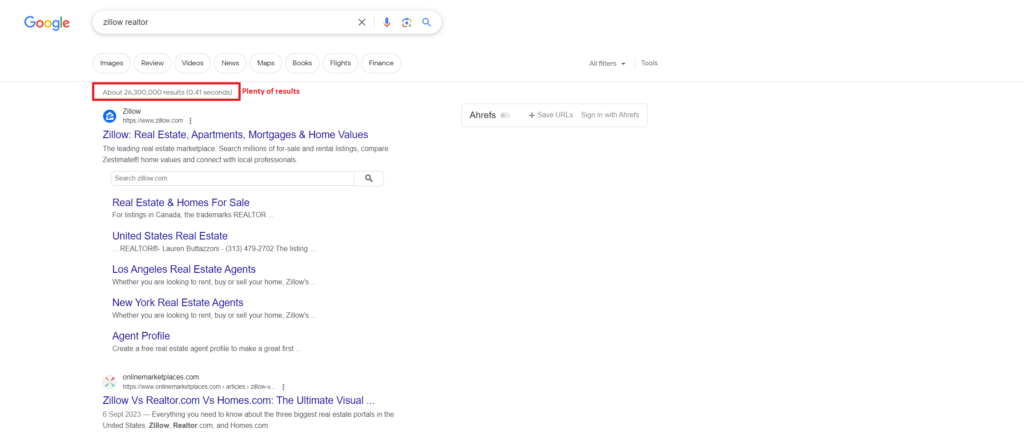
That’s probably part of the reason why ChatGPT recommended the brand. However, clearly mentions aren’t everything, since there are only around 463,000 results for “HomeLight Realtor”.
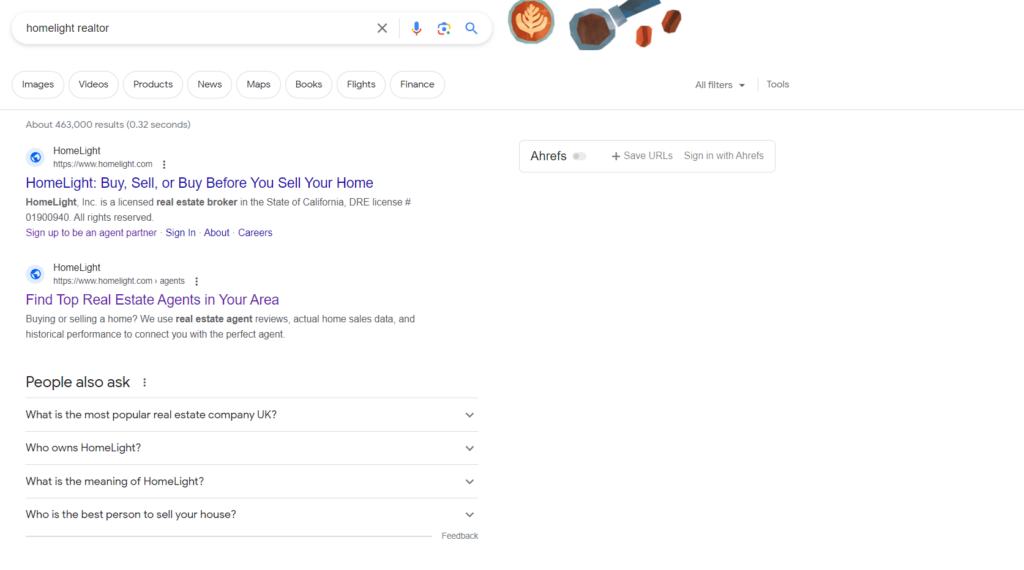
So mentions are important – but they’re not everything.
2. Reviews and Recommendations
Time and time again, when I asked ChatGPT to explain why it chose to recommend a specific agency to me, one of the first things it mentioned was a company’s track record and reputation. Again, it’s difficult to know how seriously ChatGPT takes these things.
Redfin, recommended by both the free and paid versions of ChatGPT, clearly doesn’t have the best reviews. It has a rating of only 1.5 out of 5 stars on the Consumer Affairs website, and a rating of 2.1 out of 5 on TrustPilot:
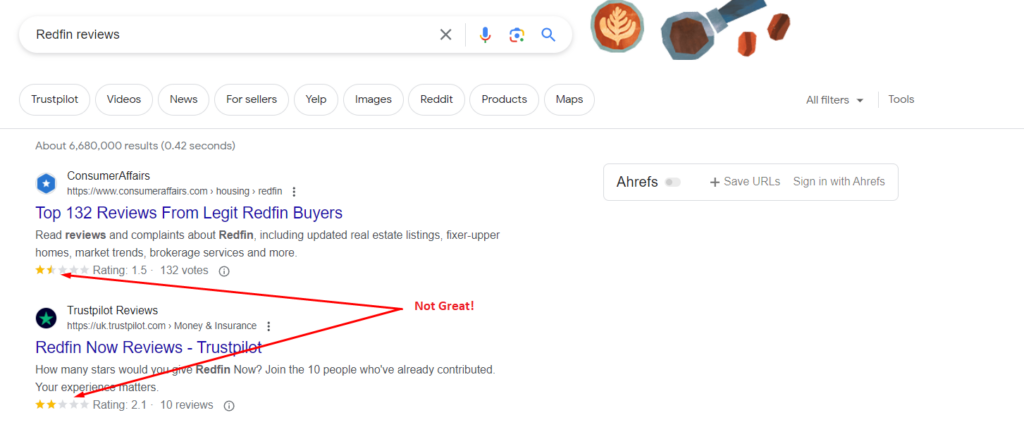
Still I think it’s worth increasing your credibility with testimonials and reviews either way. After all, we know Google takes your experience and expertise into account when ranking your site on the search engine results pages, so it makes sense that ChatGPT would do the same.
I’d advise looking for as many ways as possible to boost EEAT scores with user-generated content, and reviews both on your website and external platforms, if you want to earn ChatGPT website traffic.
3. Topical Authority
Topical authority is a common SEO concept wherein a website aims to become the go-to authority on a specific topic. It’s a good way to show the search engines you have a lot of knowledge in your specific space, and boosts your EEAT scores.
For ChatGPT, showing topical authority is a way to connect your company with as many different synonyms and terms you want to rank for in the app’s database.
For instance, when I asked ChatGPT about the top social media marketing agencies, it recommended VaynerMedia as the top choice.
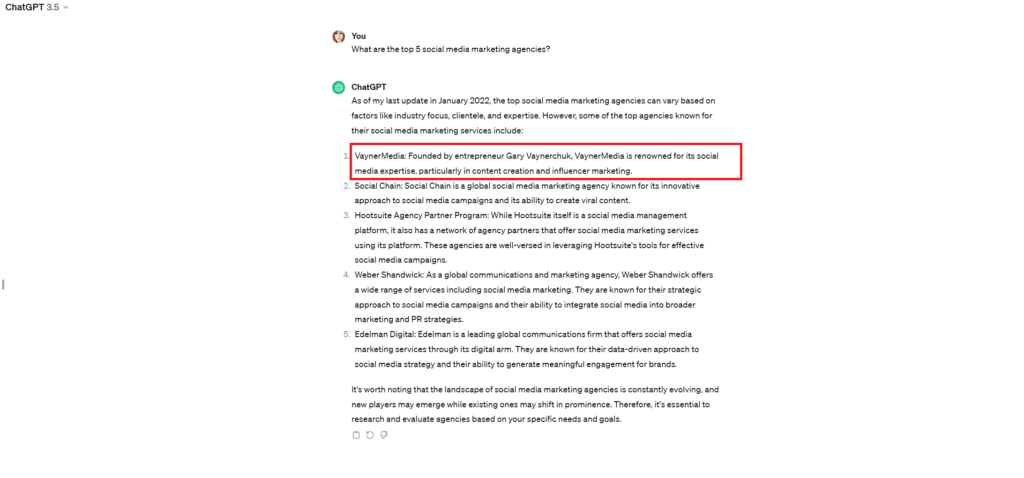
One of the reasons for this is that the VaynerMedia website targets a large number of social media-related service terms.
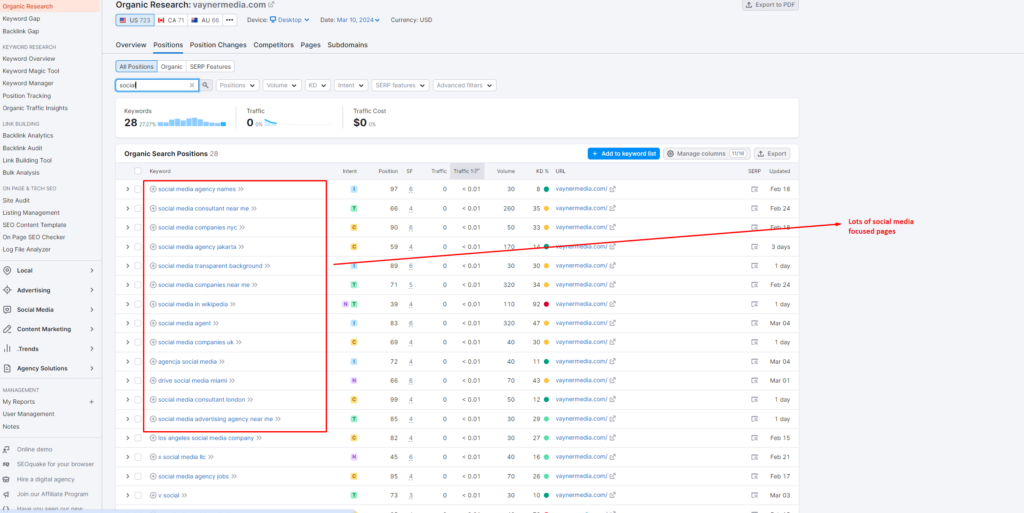
This indicates the more specific pages you create focused on a certain “term” or “topic” you want to be connected with, the more likely you are to be pinpointed by ChatGPT.
4. Company Age
Here’s an area where the difference between ChatGPT and ChatGPT Plus really stands out. When you ask the free version of ChatGPT to rank the “top agencies” or companies for something, it tends to focus on showing you companies that are older, and more established.
That’s something Neil Patel also found with his experiments.
Alternatively, if you ask ChatGPT Plus the same question, it’s less likely to focus on the age of the site, and concentrate more on its reputation in the current industry.
Similarly, the list of the top 5 social media marketing agencies generated by ChatGPT Plus recommends “MomentIQ” which only launched in 2023.

This leads me to believe that ChatGPT Plus is more focused on appearing relevant and up-to-date by recommending some of the most recent, and up-and-coming agencies. Whereas ChatGPT (the standard app), sees authority as being linked to age.
5. Authority
Finally, throughout my experiment, I noticed that ChatGPT, like Google, pays a lot of attention to authority.
It examines whether companies have “authority” by looking at various factors, such as their online reviews and ratings, industry reputations, and awards and recognitions they might have achieved. Since the app doesn’t have access to any tools for checking things like Domain Authority, I doubt this number factors in much here.
However, if you’re using the premium version of ChatGPT, it can check the internet for insights into the types of sites that also talk about the company, and make assumptions from there.
For instance, if we look at VaynerMedia we see it has all the markings of a “good authority” website, with 25.1k monthly visits, 13.4k backlinks, and 3.2k referring domains.

So, once again, I’d recommend making “authority” a priority when you’re learning how to rank your website on ChatGPT, or even if you’re just trying to boost your standard SEO scores.
How to Earn ChatGPT Website Traffic: What I’ve Learned
Ultimately, it seems like learning how to rank your website on ChatGPT isn’t all that different to learning how to boost your presence on the search engines. Following all the best-practices you would when creating content for Google, like showing authority, and highlighting a focus on exceptional customer service with reviews and recommendations still play a crucial role.
Just remember that ranking with ChatGPT isn’t an exact science.
I even asked the bot whether I’d have a higher chance of my company being recommended as a “Top NFT agency” if I followed all the steps above, and it still churned out a pretty generic response:
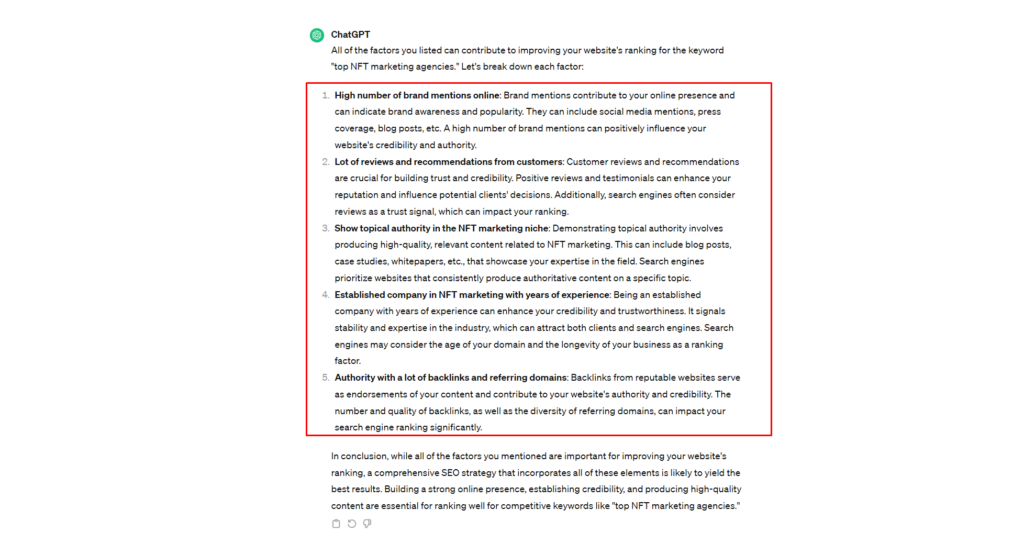
Ultimately, what I’ve learned from all this is that it is possible to use the same SEO strategies you’d use with Google to boost your chances of ChatGPT traffic. However it might not make sense to focus on “Ranking with ChatGPT” alone.
If you follow SEO best practices, your chances of gaining recommendations from ChatGPT should increase. But you’re going to need a holistic strategy.
Hire an AI SEO Agency to Rank with ChatGPT
Learning how to rank on ChatGPT isn’t simple. There’s no exact science to it. Ultimately, your chances of success depend heavily on how effective you are at search engine optimization, as well as the expertise you can access.
As leaders in AI SEO, generative AI content creation, and marketing, Crowdcreate can help companies from all industries boost their presence anywhere. We can help you stand out on the search engines, on social media channels, and even on apps like ChatGPT. Our work with Zillow just goes to prove it!
Contact Crowdcreate today to see how we can help transform your AI SEO strategy, and drive new traffic to your business.


